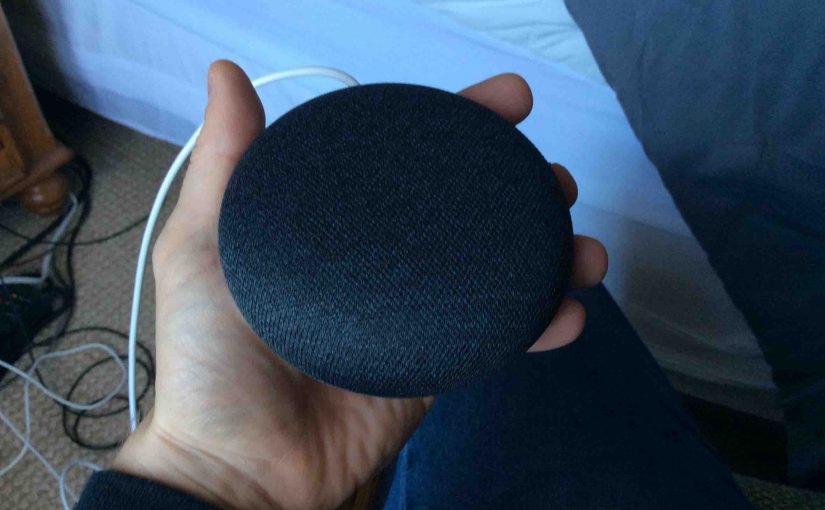There are many ways to work the Google Home Mini volume control. These depend on the app(s) you’re playing from mostly. But the Mini itself has two touch pads for controlling volume on its edges. Plus, there’s also a volume control for the speaker in the Google Home app. Finally, you can access the Google Mini volume control with voice commands to the speaker.
Below, we show these basic ways, which you can do no matter the app you’re streaming from. But we do not explore any app-specific volume controlling of the output device. This is so because with so many apps that send audio, this article would fast grow too large. So, we stick here with the basic volume controlling means here.
Accessing the Google Mini Volume Control on the Speaker Itself
You can control the volume without using any apps as follows.
1. Position the Mini so Cord is at Twelve O’Clock
Firstly, see the right way to sit this mini Google next.
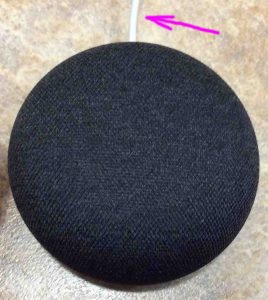
2. Tap Left and Right Edges to Set Volume
Touch the left edge of the speaker (nine o’clock) to lower the volume one increment. You can also tap the right edge of the speaker (three o’clock) to raise the volume one notch.
The next pic shows the locations of the Google Mini volume control touch pad regions. Find them in the same straight line formed by the four activity lights.
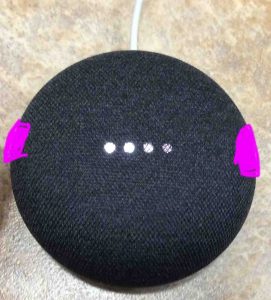
If you need finer volume controlling, then use the Google Home app to set speaker volume. Discussed below.
Set the Google Mini Volume Control with Voice Commands
The Google Mini understands two scales for volume adjustment: 0-10 and 0-100 percent. If you want to say a percent to control the volume, then add the word ‘percent’ to your request. Example commands follow.
-
- Okay Google, set volume 10 percent.
- Hey Google, set volume 76 percent.
- Okay Google, set volume 100 percent.
If you say the percent label, then 0 means lowest volume (muted) and 100 means max (full) volume. But if you omit the percent label, then the volume control range is between 0 and 10.
-
- Okay Google, set volume 5. [Sets the volume control to half, 50 percent of maximum.]
- Hey Google, set volume 0. [Sets the volume control to minimum.]
- Okay Google, set volume 10. [Sets the volume control to maximum, 100 percent]
There are also shortcut commands for minimum and maximum volume setting, as in:
-
- Okay Google, mute. [Sets the volume to zero percent, minimum, muted state.]
- Hey Google, max. [Sets speaker volume to maximum, 100 percent.]
- Okay Google, set volume half. [Sets volume control to fifty percent, or half of full.]
- Hey Google, volume full. [Sets speaker volume to maximum, 100 percent.]
- Okay Google, volume half. [Sets volume control to fifty percent, or half of full.]
- Hey Google, volume minimum. [Sets the volume to zero percent, minimum, muted state.]
Adjust the Google Mini Volume Control with the Home App
In the Home app, which must have Wi-Fi access to your speaker, you can control the speaker volume. How? By finding your speaker in the available Google devices list in the app. Then, move the volume control there left and right, until you hit the loudness you want.
Note that you can’t control speaker volume unless it is actually streaming / playing something. That is, you won’t see the volume control in the app unless streaming is in progress.
To adjust the volume from there, follow the procedure listed next.
1. Run the Home App
Do this on your mobile device. You should then see its Home screen, as shown next.
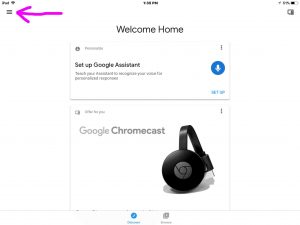
2. Tap the Main Menu ‘hamburger’ Control
Find the hamburger pointed at by the purple arrow in the last photo.
This then brings up the Main Menu, as shown next.
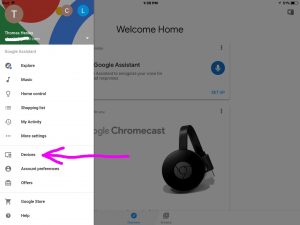
3. Tap the Devices Menu Item
See this, pointed to by the purple arrow in the last picture.
You then see the Devices screen, as seen in the picture shown in the next step.
4. On the Devices Screen, Find your Currently Playing Google Mini
See this as shown next.
The speaker is currently streaming when you see a small speaker icon (volume controlling link). Find this in the lower right edge of its device card, as pointed at by the purple arrow.
But this button does not show when not streaming. Thus, you cannot control the volume like this, when the Mini is playing nothing. So, be sure to start an audio stream to your Mini before setting volume as is done here.
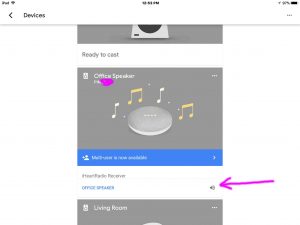
5. Tap the Google Mini Volume Control Button
See the speaker volume button in the last picture.
Tapping it then brings up the volume control screen, as pictured next.
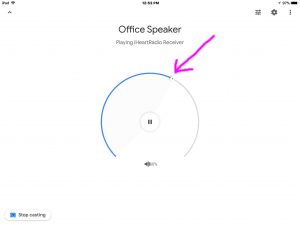
6. Touch and Drag the Volume Slider Button
Drag these left and right around the circle, until you hear your preferred volume.
The slider volume control here provides more granular control than the touch pads on the Mini itself. That is, you can raise and lower the volume in much smaller increments. This is much finer than the ten-percent jumps up and down that you get when tapping the Mini touch pads.
Note that moving this onscreen volume control around takes effect right away. No need to press any Submit buttons to force the new setting into effect.
Work the Google Mini Volume Control on a Bluetooth Source Device
If using your Google Mini as a Bluetooth speaker, you can adjust the volume control with the buttons on the paired device. Now in this demo, we’re playing YouTube content on our iPad Air, and streaming to the Mini via a Bluetooth connection.
1. Pair your Google Mini as a Bluetooth Speaker
See our post here, that demonstrates how to pair.
2. Begin Playing an Audio Source
These sources include internet radio stations, a song from Spotify, or an Audible book. In this scenario, we stream YouTube audio to our Google Home Mini, as shown next.
3. Use Source Device’s Volume Buttons to Control Google Mini Volume
See this shown next.
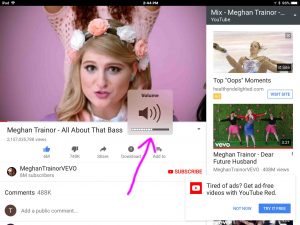
Note the purple arrowed volume control square with a speaker inside of it in the last picture.
Also note that the volume change you hear is behind by a second or so. Why? Because of the delay (latency) of the commands going across the Bluetooth airwaves.
How Google Mini Volume Control Works When Casting to This Speaker
Finally, you can cast to Google devices like the Mini too. Similar to Bluetooth, but done over WiFi instead. Yet like in this Bluetooth example, you can usually change the speaker volume control by adjusting it in the app that’s doing the casting.
But a, we don’t cover here how to control volume in individual apps. So, we leave this task as an exercise for the reader to discern.
Other Posts About the Google Mini
References for Google Mini Volume Control
Revision History
-
- 2023-02-23: First posted.
